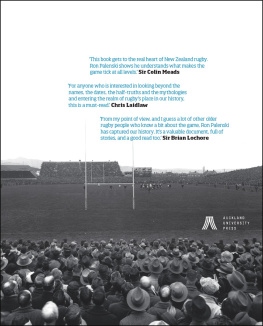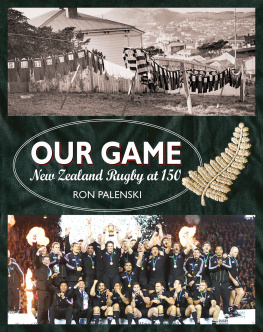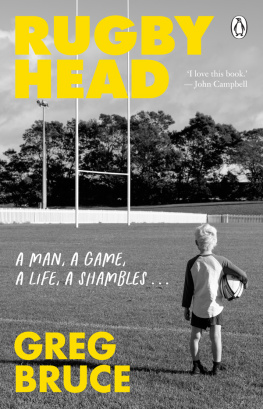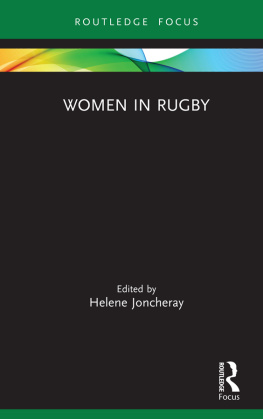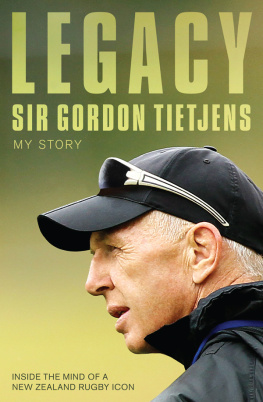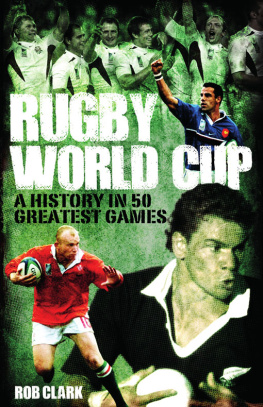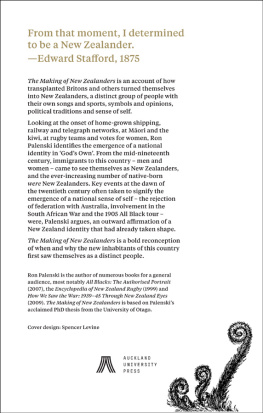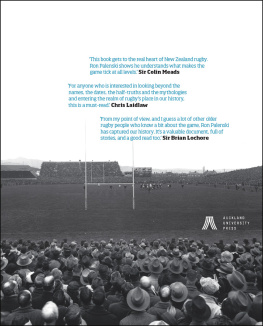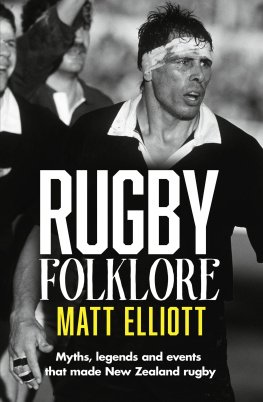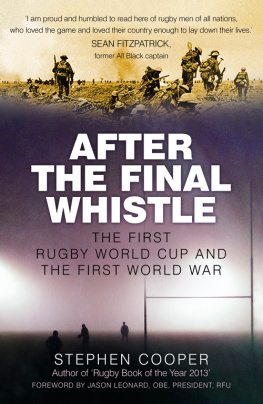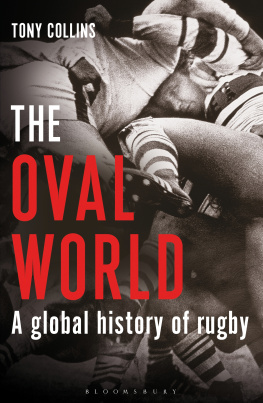RUGBY
RUGBY
A NEW ZEALAND HISTORY
RON PALENSKI

If it hadnt been for rugby, Id still be a country boy living in Te Kuiti going to the sales once a week. This is the story of the game and the men who made it. Wilson Whineray and Don Clarke, Fred Allen and Kel Tremain. Good men that all New Zealanders should know about. And a great game that I still love.
SIR COLIN MEADS
Contents
Acknowledgements
It would be neither possible nor practical to thank everyone who, wittingly or otherwise, contributed to my ability to write this book. People involved in rugby one way or another nurtured my knowledge and enthusiasm for years, from my earliest memories of watching a test match while crouched on the grass not far from the touchline. From my knee-high view then to looking down on games from the heights of grandstands, my interest in the game and all it means has never wavered.
The book would not have happened but for the suggestion that it should from Dr Sam Elworthy of Auckland University Press. Of all the many books about rugby published in New Zealand, there has never been an overall narrative history. This is an attempt to fill that gap. It is not an academic history, though I have included endnotes so readers can delve further and to add provenance. I have referred to academic historians when I have felt the need, although comparatively few in New Zealand have ever bothered much about rugby, for all its influence on the countrys history and social life. Greg Ryan in Christchurch is a notable exception.
I have tried to avoid reusing all the old sources which just get perpetuated, sometimes misleadingly, especially when it is so easy and convenient to research via Google or Wikipedia. I did use the old sources Arthur Swans two-volume History of New Zealand Rugby Football for example as a reference point but then tried to go further. The Bibliography provides a comprehensive list.
Very few letters or diaries by or about rugby players seem to have survived, but I used some I tracked down. The National Librarys website Papers Past (http://paperspast.natlib.govt.nz/cgi-bin/paperspast) has rapidly become an indispensable tool for any historian, historical writer or family researcher; it is not so much what is revealed (because that can still be found in bound volumes or on microfilm) but the speed at which it is revealed. This is matched in Australia by Trove (https://trove.nla.gov.au/newspaper) and in France by the French National Library (http://gallica.bnf.fr). There are similar, although more limited, websites for British and American newspapers. I was fortunate enough to be able to supplement those with my own extensive collections of clippings and tour scrapbooks which were started in 1921 by an ardent rugby follower in Wellington, Henry Magnussen, and continued until 1984. Many of the later volumes come with match programmes and photographs and many of the latter are included here.
Among those I thank directly are Clive Akers for his knowledge and chronicling of players; Max Cryer for advice on a variety of matters; Tim Curnow for permission to use lines of poetry from his father Allen; Peter du Chateau for helping out with a piece of his family history; Sean Fagan in Sydney for his expertise on the early days of Australian rugby (http://jottingsonrugby.wordpress.com); Brian Finn for his expertise and interest; Tony Gilbert for sharing his knowledge and astute observations; John Griffiths in Britain for his knowledge of all things rugby and correcting some of my errors; Owen and Michael Harvey for information about their relative, Ernest Denis Hoben; Frdric Humbert in Paris for his help with illustrations and answering questions about French rugby (http://www.rugby-pioneers.com); Lindsay Knight for responding to questions about players, games and people; Max Lambert for similar advice and for tracking down service records in Wellington; Bruce Leadley at Timaru Boys High School for help about Rex King; Lynn McConnell for pointing me in some directions; Brian Moloughney for his encouragement and interest in rugby; Mark Pirie for steering me in the direction of some rugby poems, including one of his own; Lee Richards in London for hunting out documents in the UK National Archives; Peter Sinclair for his yarning about football days; Bill Sutton for the use of some of his lines; Alison Waghorn for the use of diaries and other documents kept by her father, Bill Dalley. The risk in naming people in this way is unwittingly omitting some; if I have, I apologise.
Thanks, as always, are due to the ever-helpful staffs at the Hocken Collections and the Central, Law and Medical Libraries at the University of Otago; at the Alexander Turnbull Library, especially the now-retired David Colquhoun; Archives New Zealand; Births, Deaths and Marriages at the Department of Internal Affairs; the Barr Smith Library, University of Adelaide.
I also thank the photographers whose works supplement the words; some of them are known and acknowledged, some not because they could not be traced all are thanked.
Gratitude is due to Sam Elworthy and his staff, especially Anna Hodge and Katrina Duncan, for putting it together; and to my family, especially Kathy, for their continued support.
A word about words
Errors, odd spellings or misspellings in quotations have been kept as they appeared originally; if explanations or corrections seemed necessary, they have been added within square brackets or included in the endnotes. This applies to the singular or plural use of the word Mori and the use of macrons and other diacritic marks.
The word rugby is not capitalised when it is referring to the game but is capitalised when it is the school or, as in Rugby rules, in relation to the school.
The word football may to some readers mean different things. Not to me. Football covers a variety of games: rugby is one, soccer or association football is another; others are rugby league, Australian rules (AFL) or American or Canadian football.
Ron Palenski
Dunedin, March 2015
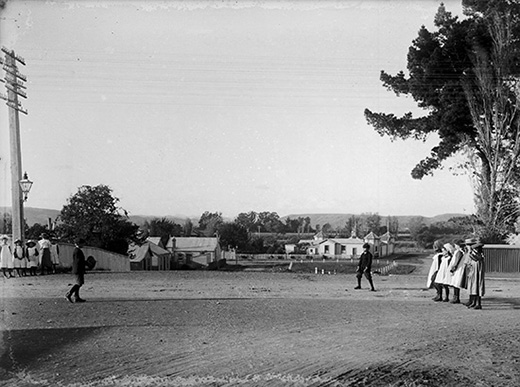
Two boys, one football, an empty street. Even spectators. An ideal chance for a bit of footy in Bell Street in Wanganui in 1906. This photo was taken by Frank Denton, about whom Truth once rhymed: the photos he takes, are no failures or fakes . This is the evidence. 1/1-017498-G, ALEXANDER TURNBULL LIBRARY.
Introduction
Out in the field the forwards are a-lining,
The backs are crouched already in their place
Cold and grey, with a wink of sun shining
Its just the day for scrum, and rush, and pace
W hen the New Zealand Rugby Football Union marked its seventy-fifth anniversary in 1967, it chose the Chief Justice of the day, Sir Richard Wild, to deliver the keynote address. Wild was more than just a formidable presence off the bench. He was a good enough rugby player as a young man to represent Wellington and was in the New Zealand Universities team that broke new ground by touring Japan in 1936. A younger brother, Peter, had also played first-class rugby and became a member of the national union council and manager of the Under 23 team that beat the All Blacks in 1973.
The anniversary was a grand affair because the union was conscious that it had not been able to do justice to its fiftieth anniversary, which had fallen in 1942 when the country was at war. All former All Blacks and national administrators were invited to the function in the Overseas Terminal on Oriental Parade in Wellington, and a test match against New Zealands most enduring foe, Australia, was played that afternoon. The old players marched around Athletic Park before the game, grouped by years with the three survivors of 1905 in the van Billy Wallace, George Nicholson and Bunny Abbott. That night, they all went off to the dinner. The Prime Minister, Keith Holyoake, was there. He had played eighteen games for Golden BayMotueka in his trimmer days. (If only he knew, hed chuckle that a statue of himself in garter robes now stands outside New Zealand rugby headquarters in Wellington surely the only statue anywhere of a hooker.)
Next page
